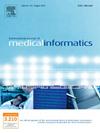Patient consent for the secondary use of health data in artificial intelligence (AI) models: A scoping review
IF 3.7
2区 医学
Q2 COMPUTER SCIENCE, INFORMATION SYSTEMS
International Journal of Medical Informatics
Pub Date : 2025-03-08
DOI:10.1016/j.ijmedinf.2025.105872
引用次数: 0
Abstract
Background
The secondary use of health data for training Artificial Intelligence (AI) models holds immense potential for advancing medical research and healthcare delivery. However, ensuring patient consent for such utilization is paramount to uphold ethical standards and data privacy. Patient informed consent means patients are fully informed about how their data will be collected, used, and protected, and they voluntarily agree to allow their data to be used for AI models. In addition to formal consent frameworks, establishing a social license is critical to foster public trust and societal acceptance for the secondary use of health data in AI systems. This study examines patient consent practices in this domain.
Method
In this scoping review, we searched Web of Science, PubMed, and Scopus. We included studies in English that addressed the core issues of interest, namely, privacy, security, legal, and ethical issues related to the secondary use of health data in AI models. Articles not addressing the core issues, as well as systematic reviews, meta-analyses, books, letters, conference abstracts, and study protocols were excluded. Two authors independently screened titles, abstracts, and full texts, resolving disagreements with a third author. Data was extracted using a data extraction form.
Results
After screening 774 articles, a total of 38 articles were ultimately included in the review. Across these studies, a total of 178 barriers and 193 facilitators were identified. We consolidated similar codes and extracted 65 barriers and 101 facilitators, which we then categorized into four themes: “Structure,” “People,” “Physical system,” and “Task.” We identified notable emphasis on “Legal and Ethical Challenges” and “Interoperability and Data Governance.” Key barriers included concerns over privacy and security breaches, inadequacies in informed consent processes, and unauthorized data sharing. Critical facilitators included enhancing patient consent procedures, improving data privacy through anonymization, and promoting ethical standards for data usage.
Conclusion
Our study underscores the complexity of patient consent for the secondary use of health data in AI models, highlighting significant barriers and facilitators within legal, ethical, and technological domains. We recommend the development of specific guidelines and actionable strategies for policymakers, practitioners, and researchers to improve informed consent, ensuring privacy, trust, and ethical use of data, thereby facilitating the responsible advancement of AI in healthcare.
患者同意在人工智能(AI)模型中二次使用健康数据:范围审查
二次使用健康数据来训练人工智能(AI)模型,在推进医学研究和医疗保健服务方面具有巨大的潜力。然而,确保患者同意此类使用对于维护道德标准和数据隐私至关重要。患者知情同意意味着患者完全了解他们的数据将如何被收集、使用和保护,他们自愿同意允许他们的数据被用于人工智能模型。除了正式的同意框架外,建立社会许可对于促进公众信任和社会接受人工智能系统中卫生数据的二次使用至关重要。本研究考察了这一领域的患者同意实践。方法:检索Web of Science、PubMed和Scopus。我们纳入了解决核心问题的英文研究,即与人工智能模型中健康数据的二次使用相关的隐私、安全、法律和伦理问题。不涉及核心问题的文章,以及系统综述、元分析、书籍、信件、会议摘要和研究方案均被排除在外。两位作者独立筛选标题、摘要和全文,解决与第三位作者的分歧。使用数据提取表单提取数据。结果筛选774篇文献后,最终纳入38篇文献。在这些研究中,共确定了178个障碍和193个促进因素。我们整合了类似的代码,并提取了65个障碍和101个促进因素,然后我们将其分为四个主题:“结构”、“人员”、“物理系统”和“任务”。我们特别强调了“法律和道德挑战”和“互操作性和数据治理”。主要障碍包括对隐私和安全漏洞的担忧、知情同意程序的不足以及未经授权的数据共享。关键的促进因素包括加强患者同意程序,通过匿名化改善数据隐私,以及促进数据使用的道德标准。我们的研究强调了患者同意在人工智能模型中二次使用健康数据的复杂性,突出了法律、伦理和技术领域的重大障碍和促进因素。我们建议为政策制定者、从业者和研究人员制定具体的指导方针和可操作的策略,以改善知情同意,确保数据的隐私、信任和道德使用,从而促进人工智能在医疗保健领域的负责任发展。
本文章由计算机程序翻译,如有差异,请以英文原文为准。
求助全文
约1分钟内获得全文
求助全文
来源期刊

International Journal of Medical Informatics
医学-计算机:信息系统
CiteScore
8.90
自引率
4.10%
发文量
217
审稿时长
42 days
期刊介绍:
International Journal of Medical Informatics provides an international medium for dissemination of original results and interpretative reviews concerning the field of medical informatics. The Journal emphasizes the evaluation of systems in healthcare settings.
The scope of journal covers:
Information systems, including national or international registration systems, hospital information systems, departmental and/or physician''s office systems, document handling systems, electronic medical record systems, standardization, systems integration etc.;
Computer-aided medical decision support systems using heuristic, algorithmic and/or statistical methods as exemplified in decision theory, protocol development, artificial intelligence, etc.
Educational computer based programs pertaining to medical informatics or medicine in general;
Organizational, economic, social, clinical impact, ethical and cost-benefit aspects of IT applications in health care.
 求助内容:
求助内容: 应助结果提醒方式:
应助结果提醒方式:


